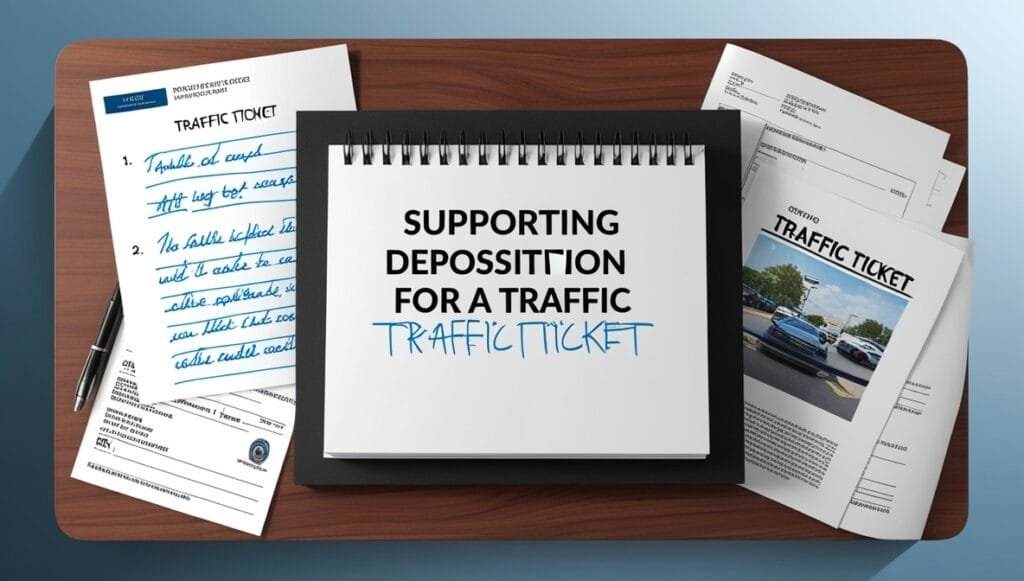What Is a Supporting Deposition for a Traffic Ticket – If you’ve ever received a traffic ticket in the United States, you may have come across the term “supporting deposition.” Understanding this crucial document can be essential in navigating the legal process surrounding traffic violations. Let’s dive into what a supporting deposition is, why it matters, and how it can impact your traffic ticket case.
Understanding Supporting Depositions
A supporting deposition is a detailed statement provided by the police officer who issued your traffic ticket
This document elaborates on the circumstances surrounding the alleged violation, offering more information than what’s typically included on the ticket itself.
Key Features of a Supporting Deposition
- Detailed Narrative: It contains the officer’s account of what happened, including observations about road conditions, traffic, and your driving behavior.
- Evidence Description: The deposition may include information about the methods used to determine a violation, such as the type of radar gun used for speeding tickets.
- Legal Requirement: In many jurisdictions, you have the right to request a supporting deposition within a specific timeframe after receiving a ticket.
Why Supporting Depositions Matter

Understanding the importance of a supporting deposition can be crucial for anyone dealing with a traffic ticket:
- Provides Crucial Details: It offers a clearer picture of the evidence against you, which is vital if you’re considering contesting the ticket.
- Helps in Defense Preparation: The additional information can assist you or your attorney in crafting a more informed defense strategy.
- Legal Implications: Failure to receive a requested supporting deposition can sometimes lead to the dismissal of a ticket.
How to Request a Supporting Deposition
The process for requesting a supporting deposition may vary by jurisdiction, but generally:
- Check the Ticket: Some tickets include an option to request a supporting deposition directly on the form.
- Submit a Written Request: If not included on the ticket, you typically need to submit a written request to the court or police department.
- Timing is Crucial: Requests usually must be made within 30 days of receiving the ticket or by the arraignment date.
People Also Ask
Q: Can I just pay my ticket without getting a supporting deposition?
A: Yes, you can pay your ticket without requesting a supporting deposition. However, doing so is typically considered an admission of guilt and waives your right to contest the violation
.Q: What happens if I don’t receive the supporting deposition after requesting it?
A: If you don’t receive the supporting deposition within the legally specified timeframe (usually 30 days after the request), you may have grounds to argue for dismissal of the ticket.
Q: Is a supporting deposition required for all traffic tickets?
A: Not always. Some jurisdictions, like New York City, Rochester, and Buffalo, don’t require supporting depositions for traffic violations.
The Impact on Your Case
A supporting deposition can significantly influence the outcome of your traffic ticket case:
- Potential Dismissal: If the deposition is not provided as required, it could lead to the dismissal of your ticket.
- Defense Strategy: The details in the deposition can help you identify potential weaknesses in the officer’s case against you.
- Plea Decisions: Understanding the full extent of the evidence against you can inform your decision on whether to plead guilty or contest the ticket.
Conclusion
A supporting deposition is a valuable tool in understanding and potentially contesting a traffic ticket. By providing detailed information about the alleged violation, it allows you to make more informed decisions about how to proceed with your case. Whether you’re dealing with a speeding ticket, a red light violation, or any other traffic infraction, knowing your rights regarding supporting depositions can be crucial in navigating the legal process effectively.Remember, traffic laws and procedures can vary by state and locality, so it’s always wise to consult with a local traffic attorney or legal expert for advice tailored to your specific situation.






